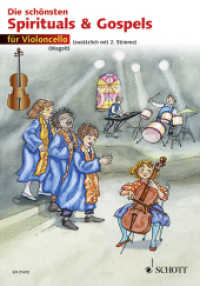- ホーム
- > 洋書
- > 英文書
- > Philosophy
Full Description
This volume offers a new framework for understanding expertise. It proposes a reconceptualization of the traditional notion of expertise and calls for the development of a new contextual and action-oriented notion of expertise, which is attentive to axiological values, intellectual virtues, and moral qualities.
Experts are usually called upon, especially during times of emergency, either as decision-makers or as advisors in formulating policies that often have a significant impact on society. And yet, for certain types of choices, there is a growing tension between experts' recommendations and alternative views. The chapters in this volume critically assess the idea of whether possessing epistemic authority can automatically make someone's assertions necessarily more grounded than others. They not only evaluate the epistemological implications of this idea but also reflect on its ethical, socio-cultural, and political consequences. The interdisciplinary framework advanced across the chapters seeks to overcome certain limitations that underlie current models of expertise by adopting more inclusive and representative decisions that can improve the perceived neutrality of experts' decisions. Increasing neutrality means reducing cases in which an unidentified bias - be it a scientific one or not - puts any of the individuals involved in a specific public choice at a systematic disadvantage.
Philosophy, Expertise, and the Myth of Neutrality will appeal to scholars and advanced students working in epistemology, philosophy of science, philosophy of the social sciences, public policy, and sociology.
Contents
Introduction: Gripping with the myth of neutrality Mirko Farina and Andrea Lavazza Part 1: Defining Expertise 1. Trustworthy experts and untrustworthy experts: Insights from the cognitive psychology of expertise Andrew J. Waters and Fernand Gobet 2. Covid-19 and denialism: A primer on cognitive psychology for science communicators and policymakers Andrea Lavazza and Mirko Farina 3. Do we still need experts? Nick Brancazio and Neil Levy 4. Hypocritical experts Duncan Pritchard 5. The epistemic authority of practice Dylan Mirek Popowicz Part 2: Expertise in Action 6. Reimagining expertise and neutrality toward epistemic justice in research, clinical translation, and policy: A perspective from neuroethics Anna Nuechterlein, Quinn Boyle, and Judy Illes 7. Expertise in action: Insights from Naturalistic Decision Making (NDM) Olivia Brown, Nicola Power, Neil Shortland, and Julie Gore 8. What the pandemic showed us about reason and values Ulrike Hahn and Stephan Lewandowsky 9. The priests of the biomedical religion: Against a flawed understanding of experts Ralf J. Jox 10. Scarce resource allocation during infectious disease outbreaks: A communitarian perspective Xiaozheng Yang and Yali Cong Part 3: Expertise and its Values in the New World 11. Legal expertise and its subject matter within common law adjudication John Coggon 12. The revolution of (neuroscience) experts in the courtroom? Ilaria Zampieri, Matteo Pirisi, and Pietro Pietrini 13. When the politics of contextuality (can) subvert science: A case study of Australian women's perceptions of alcohol consumption and breast cancer risk Kristen Foley, Belinda Lunnay, and Paul R. Ward 14. The post-truth challenge to expertise Douglas V. Porpora 15. Expertise for a New World: Is bioarchaeology fit for purpose? Charlotte A. Roberts






